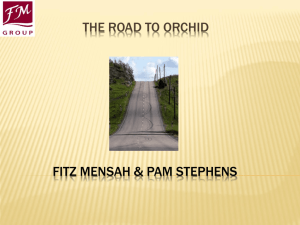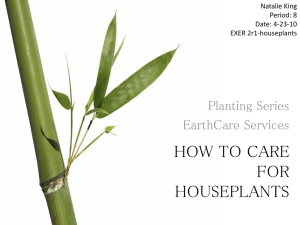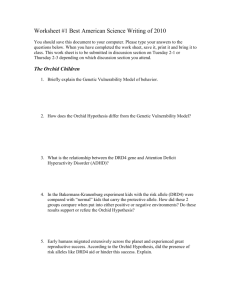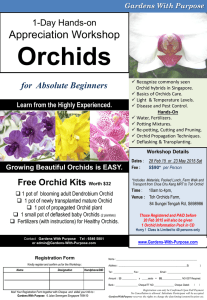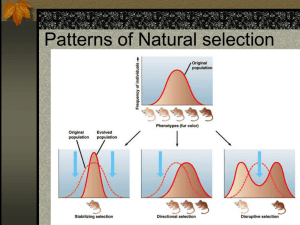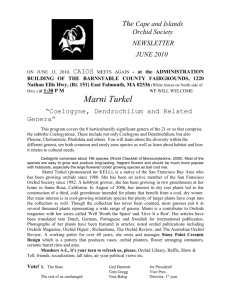AAE 2-16-2012 Class Notes
advertisement
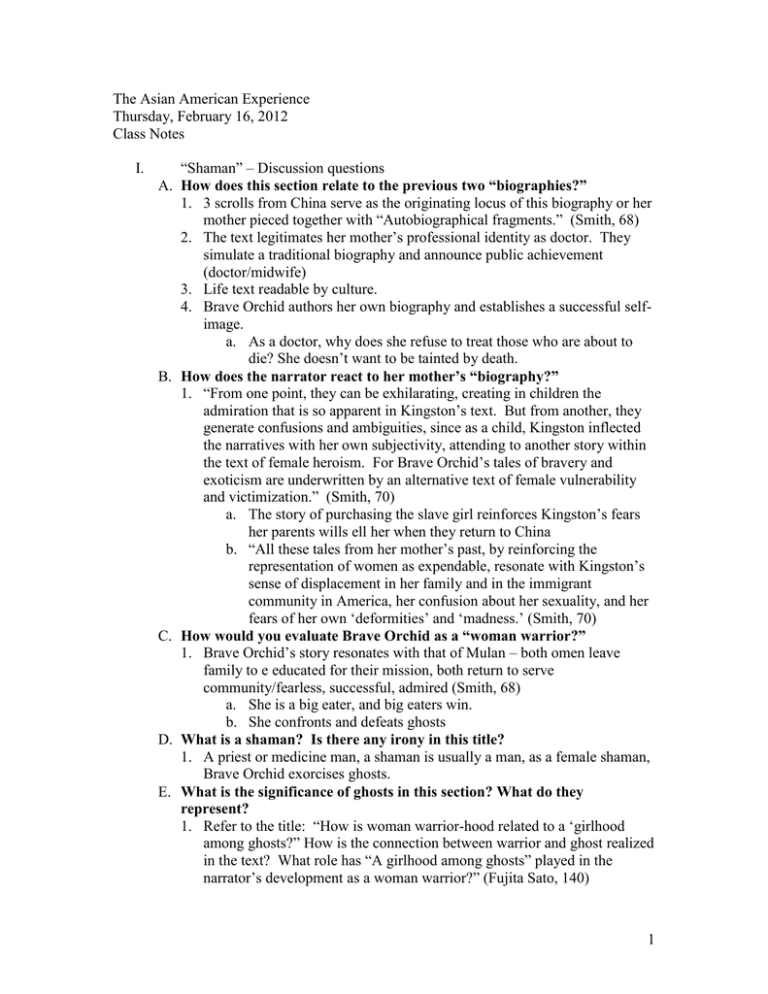
The Asian American Experience Thursday, February 16, 2012 Class Notes I. A. B. C. D. E. “Shaman” – Discussion questions How does this section relate to the previous two “biographies?” 1. 3 scrolls from China serve as the originating locus of this biography or her mother pieced together with “Autobiographical fragments.” (Smith, 68) 2. The text legitimates her mother’s professional identity as doctor. They simulate a traditional biography and announce public achievement (doctor/midwife) 3. Life text readable by culture. 4. Brave Orchid authors her own biography and establishes a successful selfimage. a. As a doctor, why does she refuse to treat those who are about to die? She doesn’t want to be tainted by death. How does the narrator react to her mother’s “biography?” 1. “From one point, they can be exhilarating, creating in children the admiration that is so apparent in Kingston’s text. But from another, they generate confusions and ambiguities, since as a child, Kingston inflected the narratives with her own subjectivity, attending to another story within the text of female heroism. For Brave Orchid’s tales of bravery and exoticism are underwritten by an alternative text of female vulnerability and victimization.” (Smith, 70) a. The story of purchasing the slave girl reinforces Kingston’s fears her parents wills ell her when they return to China b. “All these tales from her mother’s past, by reinforcing the representation of women as expendable, resonate with Kingston’s sense of displacement in her family and in the immigrant community in America, her confusion about her sexuality, and her fears of her own ‘deformities’ and ‘madness.’ (Smith, 70) How would you evaluate Brave Orchid as a “woman warrior?” 1. Brave Orchid’s story resonates with that of Mulan – both omen leave family to e educated for their mission, both return to serve community/fearless, successful, admired (Smith, 68) a. She is a big eater, and big eaters win. b. She confronts and defeats ghosts What is a shaman? Is there any irony in this title? 1. A priest or medicine man, a shaman is usually a man, as a female shaman, Brave Orchid exorcises ghosts. What is the significance of ghosts in this section? What do they represent? 1. Refer to the title: “How is woman warrior-hood related to a ‘girlhood among ghosts?” How is the connection between warrior and ghost realized in the text? What role has “A girlhood among ghosts” played in the narrator’s development as a woman warrior?” (Fujita Sato, 140) 1 2. Ghosts – a multiple signifier representing both concrete phenomena and abstractions 3. Fear of the unknown or unexplainable – anything not understood (ie. The death of her two children (70,74), tradition, sitting ghosts who want babies/lives) 4. Ghosts define two antithetical worlds that threaten the narrator’s sense of a unified self. 5. Ghost-hood is a self-imposed, willing embracing, rewarding experience of alienation. The loss of identity through separation from one’s primary social unit. (Sato, 141) 6. “The Sitting Ghost” – kills babies (70), death of the narrator’s brother and sister (60) a. Brave Orchid risks encountering a “ghost” as a means of controlling these fears of failure and abandonment, and as if to embody her psychological burdens, the Sitting Ghost’s weapon is suffocating, paralyzing weight. b. Brave Orchid talks the Sitting Ghost out of existence. c. The community of women (75-76) help Brave Orchid to find her way back home by calling out directions to school not her home village (like in Toni Morrison’s Beloved, women at as community to exorcise ghosts) d. Ghost of the “No Name Woman”/aunt e. “Ghost” develops into a capacious literary metaphor (like “invisibility” in Ellison’s Invisible Man. “The narrator of The Woman Warrior discovers a regenerative potential in “Ghosthood” after experiencing and witnessing its negative forms of denial, death, misrepresentation and voicelessness. When reinterpreted as self-empowering isolation, “ghosthood” becomes the means of cultivating physical stamina, selfreliance, and mental agility of exorcising debilitating insecurity while renewing self-confidence. (BO challenging the Sitting Ghost), of reconstructing needed ties to family and tradition (the narrator invoking her aunt’s ghost), and forging kinship across cultures (No Name Woman keeping silence.) (Sato, 142) 7. American ghosts (96) – America is full of ghosts. Why are white/Caucasian Americans called ghosts? a. Reference to lighter skin color. b. Something not totally understood, not considered wholly human. F. What is the significance of the food/alimentary images in the narrative? Why are all heroes bold towards food? (85) Why do big eaters win? (90) 1. Some of you may have grandparents who demonstrate behaviors as a result of the Great Depression- keep all left-overs. 2. In American culture, we also have expressions that indicate that “big eaters win.” What are they? a. Swallow your pride 2 b. Stomach an insult c. Eat crow. 3. The narrator’s mother is a big eater. She has the ability to eat unappetizing substances and still extract sustenance. 4. Menu of exotic food. (90) 5. Rule to live by: “If it tastes good, then tis bad for you/if it tastes bad, then its good for you.” (92) 6. Survival is incompatible with a finicky palate (Wong, 26) 7. Food pornography (Wong, 85) – Making a living by exploiting the exotic aspects of one’s ethnic food-ways. Reifying perceived cultural differences and exaggerating one’s otherness in order to gain a foothold in white dominated society. Is Kingston guilty of food pornography? 8. What is the significance of the cannibalistic images in the narrative? How do we sacrifice our own for our survival? a. Quasi-cannibalism – family and sacrifice. “Like devouring like” b. Images of the monkey feast (91) – Often the code of necessity creates its own enslavement. One sacrifice calls for another. (Wong, 33) c. Chicken (124) d. Sacrifice of the ‘crazy’ woman by her own people (96) e. When the narrator is home, she gets sick. (108) f. Sacrifice of Moon Orchid by Brave Orchid. g. Sacrifice of the narrator by her parents. 9. In light of the food imagery, what is the significance of the mother’s talk story of the child born without an anus? Ingestion is a method to mediate between self and outside world. The inability to process the external world/stimuli results in dysfunction, death. G. Many students find Brave Orchid to be a “bad mother.” Assess her ability to be a mother. How would you characterize the relationship between mother and daughter in the narrative? 1. The job of a mother is to prepare her children to be independent, adults. 2. Paradox – Brave Orchid’s name is a paradox. Her stories challenge the narrator to establish realities. (5) 3. Stirs fear in her daughter – through her stories of the “No Name Woman,” the girls sold as slaves, “My mother has given me pictures to dream nightmare babies that recur.” (86) 4. Talk story – allied in the interpenetration of their stories 5. Protects her (76), felt loved when her mother leads her out of nightmares. 6. The narrator is jealous of her relationship with slave/nurse. (82) 7. Brave Orchid can’t bear to be without her daughter, reconciliation, “Good Night, Little Dog.” (Term of endearment) II. “At the Western Palace” – Discussion A. The title of this chapter is derived from this talk story: “A Long time ago, the emperors had four wives, one at each point of the compass, and they lived in four palaces. The Empress of the West would connive for power, but 3 the Empress of the East was good and kind and full of light. You are the Empress of the East, and the Empress of the West has imprisoned the Earth’s emperor in the Western Palace. And you, the good Empress of the East, come out of the dawn to invade her land and free the Emperor. (143) B. Explain the significance of the title of this section? 1. Moon Orchid, the wife from China (the East) has come to the West (the US) and Brave Orchid wants her to reclaim her husband. C. What is the tone of this chapter? 1. Tragic/Comedic 2. Tragic: Moon Orchid goes mad, her plight is unfortunate and demonstrative of the negative effect of culture on women. 3. Comedic: (Calls to mind any time that we have had a weird relative come and stay). Moon Orchid with Brave Orchid’s children, fantastic story of meeting Moon Orchid’s husband. D. What are Moon Orchid’s perceptions of Brave Orchid’s children? 1. Treat lovers (113,114) 2. Savages (133) 3. Brave Orchid questions their awards and trophies (129) 4. MO thinks they are capable but not humble. When she compliments them, they do not act with humility. E. How do the two sisters, Brave Orchid, and Moon Orchid, compare as sisters? Do they serve as literary foils to one another? Brave Orchid (Necessity) Moon Orchid (Extravagance) Yang Yin Name: bravery, toughness, militancy Name: evokes evanescence, beauty, (Brave Orchid’s name is an softness, femininity oxymoron/paradoxical) How does her Brave Orchid refers to her as the name relate to her personality? “lovely, useless type” (128) Delicate w/ long fingers and thin soft hands; high class city accent (127) No rings, get in the way of work (127) Wears rings (127) and jewelry in plain sight off the plane (117) Hard working All jobs at the laundry are too difficult for her (136), reduced to folding towels Takes only what is useful (141) Unpacks beautiful but fragile, impractical gifts (139), paper cutouts (What is the significance of the paper cutouts? Puppets) 1. A repressed extravagance manifests itself as Brave Orchid’s “playing with her sister’s life.” a. Like a director, BO imagines the various scenarios she could make b. “I can think of hundreds of things. Oh how I’d love to be in your place. I could tell him so many things. What scenes I could make. You’re so wishy washy.” (126) 4 c. Brave Orchid arranges her niece’s marriage so she could get her mother over to the US. d. BO has to baby everyone. (146) e. Orchestrates MO feigning fainting, so that her husband would come down from his office. (150) f. MO is content to live with BO or to see her grandchildren. F. Why does Brave Orchid go to such great lengths to have Moon Orchid confront her husband? 1. “You made her live like a widow.” (No Name Woman and BO both had to live like widows, BO inadvertently becomes the champion of wives who had to bear the lonely life while their husband went to Gold Mt. (153) G. How would you rate the husband’s actions in this chapter? 1. “Suddenly the two women remembered that in China families married young boys to older girls, who baby-sat their husbands their whole lives.” (152) 2. “You go live with your daughter. I’ll mail you the money I’ve always sent you. I could get arrested if the Americans knew about you. I’m living like an American.” (153) 3. When questioned as to why he didn’t break things off, he responds, “I don’t know. It’s as if I had turned into a different person. The new life around me was so complete; it pulled me away. You became people in a book I had read a long time ago.” (154) H. What eventually happens to MO? Why does she go mad? Is it simply because of the infidelity of her husband? 1. Becomes voiceless/silenced a. I’m so scared, her voice was fading (150) b. “Moon Orchid started to whimper.” (152) vs. Brave Orchid could not keep silent.” (152) c. “What do you want?” he asked. She shrank from his stare; it silenced her crying.” (152) d. “You can’t talk to them. You can barely talk to me.” “Moon Orchid was so ashamed; she held her hands over her face. She wished she could also hide her dappled hands. Her husband looked like one of the ghosts passing the car windows, and she must look like a ghost from China. They had indeed entered the land of ghosts, and they had become ghosts.” (153) 2. MO suffers from depression. a. She takes Thorazine. (157) 3. Madness: “Brave Orchid saw that all variety had gone from her sister. She was indeed mad. The difference between mad people and sane people, Brave Orchid explained to the children, ‘is that sane people have variety when they talk story. Mad people have only one story that they talk over and over.” (159) I. Is Brave Orchid responsible for Moon Orchid’s breakdown? 1. BO’s guilt: “Tears fell from BO eyes. She had whisked her sister across the ocean by jet and then made her scurry up and down the Pacific coast, back and forth across Los Angeles. MO had misplaced herself her spirit (her attention, BO held her sister’s head as she pulled on her earlobes. She would make it up to her.” (157) 5 J. How does Moon Orchid rate as a woman warrior? Moon Orchid as antiwarrior. 1. “While there is something delightfully childlike, curious and naïve about that narration of other people’s lives, there is a more profound sadness that a woman in her sixties unformed and infantile has no autobiography of her own.” (Smith, 72) 2. She is the 1st wife and when her husband denies her this role, she cannot make up another identity for herself. “When her husband rejects her, he denies the very ontological basis on which Moon Orchid’s selfhood is predicated and effectually erases her from the lines of descent. He also undermines with his negation of her role what autobiographical representations she has managed to create for herself.” (Smith, 72) K. Why does the chapter conclude with the daughters swearing not to let men be unfaithful? Why do her children make up their minds to major in math and science? (160) 1. Protection mechanism, they learn from their elder’s mistakes. 6
